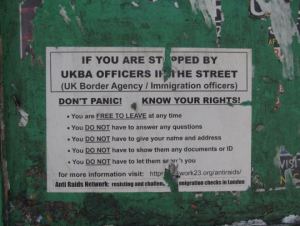Post from http://theviolentminority.wordpress.com- follow them cus they is comrades ennit
[Tags taken From Original Post]
The following list, is a collation of different “tactics” or actions that people may consciously or unconsciously use in meeting, conversation or other group settings to dominate and exclude others (alternatively as a method of self defence against dominators in some cases). We think they are really useful to look at and think about within the program of evolving our selves, challenging our own dominant behaviours and those of others around us and generally making a conversations and actions more radical, equal and revolutionary.
1) Make them invisible
Make someone feel ‘invisible’, by ignoring them or their ideas. You can do this by not asking them to speak, doing other things while they are speaking, interrupting them before they are finished, and not responding to their ideas. This should make them feel insignificant, unsure of themselves, and incapable of action. Another option is ‘pirating’ their ideas – giving someone else credit, even though they did not come up with it first.
Example 1: When it is someone’s turn to speak, start talking to the person next to you
Example 2: When someone proposes an idea, don’t respond to it – act like it never happened
2) Ridicule them
Constantly degrade and make fun of someone, or their social group, or their ideas. This will make them feel stupid and embarrassed, and make them look less important in the eyes of others. Ridiculing is effective because laughter is on your side, and the other person will look boring if they tell you to stop. You can do this by making sexist or racist comments about people, patronising them by acting like they can’t understand you, and making fun of them personally (for example, the way they speak). Always talk about how and why they speak, rather than what they actually say.
Example: When you disagree with a woman, make a joke about women being ‘emotional’ or ‘irrational’. If you are criticised, just pass it off as ‘banter’.
3) Withhold information from them
Keep someone out of where the real decision-making happens, or keep useful information away from them. Form small, informal groups where you can discuss things away from those you want to oppress. This not only means you can make the real decisions without their input, but keeping them out of the discussion also means you don’t have to tell them everything you know.
Example 1: Exclude people with less money from a meeting by going to a posh pub to chat beforehand
Example 2: When you make points at a meeting, use academic words that only a few people will understand
4) Criticise them, regardless of what they actually do
Find reasons to punish or complain about someone, regardless of what they actually do. You should always give a reason for the criticism, so the real reason you are belittling them (e.g. because of their class, race, or gender), is not obvious to anyone listening. The fact you always complain regardless of what they do means that they will feel trapped. Eventually the constant criticism, which no-one else seems to get, will make them feel unwelcome and excluded.
Example 1: Accuse women of weakness when they try to listen and not interrupt people, but accuse them of not being feminine when they stand up for themselves.
Example 2: Use the techniques in this guide to oppress other people, but call people out for using them if they fight back
5) Lay the blame on them
When someone starts to notice that they are being oppressed, blame them for it, even though it is your fault. This will make it harder for them to realise or stop what is really going on – by creating doubt about whose fault it is, and by making them feel guilty or embarrassed whenever they try to pick you up on it. Try to make them feel as though they are being oppressed because they themselves are inadequate. This will also help you and other oppressors to feel justified, and stop you from questioning yourself or feeling guilty.
Example: When someone in a group complains that a small number of people are making all the decisions, tell them that it is their fault for not doing enough of the work (even though the reason they don’t take on more is because you have excluded them)
6) Treat them like objects
Treat someone as though they were an object, not a person – talk about and judge their appearance when it isn’t relevant. This will distract others from what they are actually saying, and make them get taken less seriously. It will also empower you to oppress them further, as treating them like an object means you will feel less sympathy for them, and means you will feel justified in treating them as less important than you. If you do it in their presence, it will embarrass them, and cause them to take themselves less seriously.
Example: Make remarks about the sexual attractiveness of the women in your group
7) Threaten or use violence
Threatening someone with violence makes them feel afraid and unsafe, while making you feel strong. Though you can directly threaten someone, it can also be done subtly – for example by intimidating someone physically, showing aggression with your voice and body language. Aggressive talk and action creates a space that will feel especially unsafe for groups that are often on the receiving end of violence. This happens even when the aggression is between people who it doesn’t make feel unsafe – because everyone who hears it will worry that they will have to face the same aggression if they say anything.
Example 1: Show disagreement by making threats rather than arguments, such as: “Feminists should be shot for dividing the movement!”
Example 2: Start arguments with anyone who disagrees with you – making sure to raise your voice, cut in when they’re speaking, etc
————————
This post was inspired by Berit Ås, a Norwegian feminist and social psychologist. In looking at the question of how men maintain their superiority in society, she put together the five ‘Master Suppression Techniques’, which she observed being used by men to oppress women. For more information, I suggest you start by reading the following:
- https://en.wikipedia.org/wiki/Master_suppression_techniques
- http://hem.bredband.net/b125645/Artemis/Techniques/index.htm
- http://ec.europa.eu/justice_home/daphnetoolkit/files/projects/2002_181/int_domination_techniques_norway.pdf
I should also add a disclaimer: the point of all of this is to expose how the “systematically privileged” keep and use their power. For one thing, this means that the techniques above are a lot more damaging when used against people who face constant and “systematic” oppression (for example, on grounds of gender, race, social class, etc). For another, using these techniques isn’t necessarily oppressive – in some circumstances they can be used to fight back too. For example, being aggressive with people, even to the extent of using violence against them, may well be the only possible response to people using these techniques. Basically, what I’m trying to say is: “manarchists”, you are not being oppressed by feminists, please fuck off and do not use this guide for your own twisted ends. Christians (in the UK) – you are not being victimised or systematically oppressed for your religion in this country at the moment: what is happening is that you are slowly loosing the unfair privilege and power you have had for hundreds of years, and if you actually believed what your religion says then you’d be grateful for this! Ok, rant over…
Final note: Please feel free to copy/re-print/plagiarize this article however you like.

